Final Update: July-September 2021
When we received Shatha’s final narrative report on the Lajee Centre’s community hydroponic garden, we were left agape at the sheer passion, drive, and dedication both the organisers and participants put into nurturing this project.
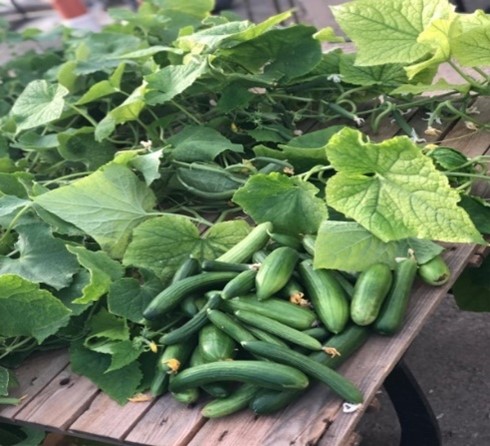 Such devotion and enthusiasm have unsurprisingly yielded admirable results. During the course of the year, Shatha and her team were able to initiate projects such as conducting research on food sovereignty and hydroponics, building horizontal and vertical layers with extensive piping systems for food cultivation, organising breakfasts and workshops for locals and beneficiaries, and constructing a new rooftop garden in the Aida Refugee Camp (to name just a few).
Such devotion and enthusiasm have unsurprisingly yielded admirable results. During the course of the year, Shatha and her team were able to initiate projects such as conducting research on food sovereignty and hydroponics, building horizontal and vertical layers with extensive piping systems for food cultivation, organising breakfasts and workshops for locals and beneficiaries, and constructing a new rooftop garden in the Aida Refugee Camp (to name just a few).
This communal garden has proven to be more than just a space for food cultivation: the project has been a way of demonstrating and practicing cultural and creative forms of Palestinian independence and resistance by empowering local communities and giving them opportunities to reclaim their agency. This further means that the project relies heavily on local solutions to resolve local problems which, in our opinion, is the most effective and sustainable way to tackle issues. Only then can communities flourish peacefully and robustly as intended, and only then will change be real and representative of the people’s voices. Ultimately, the key takeaway here is to work collectively, and to quote the Lajee Centre’s motto, “To dream together, to work together, to decide together, to build a future together.”
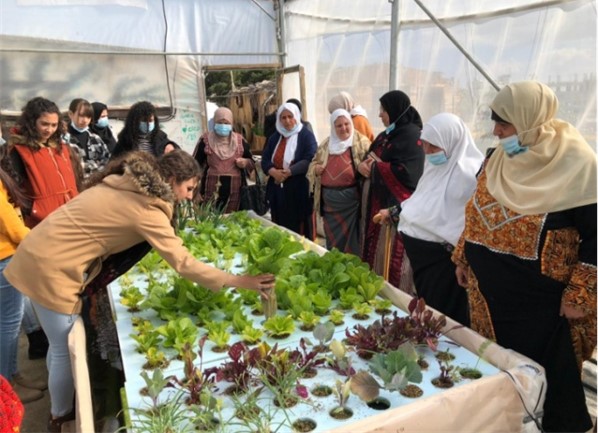 We are once again immensely proud of all the work Shatha, the Lajee Centre, and all its participants have achieved over the past couple of months, especially considering that these times have presented considerable challenges to the community. We at the Refugee Entrepreneurial Fund will certainly be following future progress on their social media platforms for the time to come.
We are once again immensely proud of all the work Shatha, the Lajee Centre, and all its participants have achieved over the past couple of months, especially considering that these times have presented considerable challenges to the community. We at the Refugee Entrepreneurial Fund will certainly be following future progress on their social media platforms for the time to come.
![]()
Update 2: April-June 2021
Regardless of the continuing turmoil between Palestine and Israel, Shatha’s team have made incredible progress to drive their dreams for a communal hydroponic garden forward.
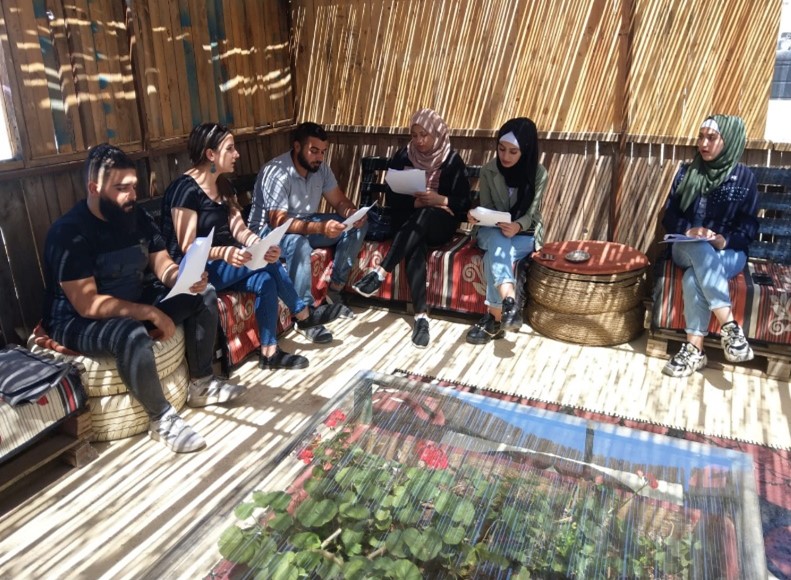
This photograph taken by the Lajee Centre shows the Environmental Unit and the research team hard at work, discussing future plans for the project whilst enjoying the protection of the cool shade during a hot summer day. These couple of months have been busy for the Environmental staff, who have recently begun their research on hydroponics by creating maps of fresh food consumption in UN-run camps and developing more ambitious goals for the future. In fact, their hopes of enlarging the hydroponic space have slowly but surely turned into a reality, as exemplified by the building of a new roof-top garden in the Aida refugee camp. Their aspirations to grow the garden to support an extra 3,500 people is certainly making headway. And we must not forget to mention the fruits of their labour! With the changing of the seasons the gardeners were able to harvest their seasonal vegetables, including refreshing summer crops such as cucumbers, tomatoes, and courgettes that were then distributed to the project’s patients and families. The Environmental Unit, thanks to their in-depth expertise and experience, have also been occupied with managing and facilitating the programme. Not only did they aid in installing the gardens, but upon their completion the staff also supported the project by sharing their knowledge on crop cultivation with the students.
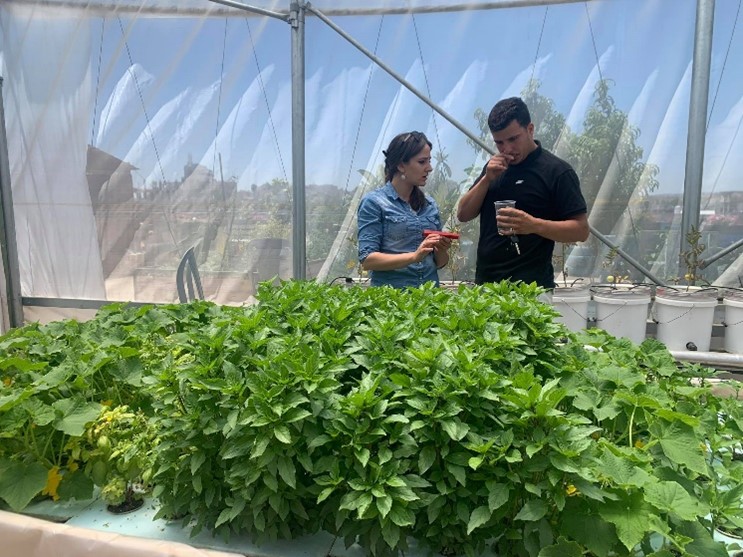
Here the Environmental staff adjusting levels of PH, TDS, and EC measurements of the hydroponic crops, according to the optimal level
![]()
Update 1: February-March 2021
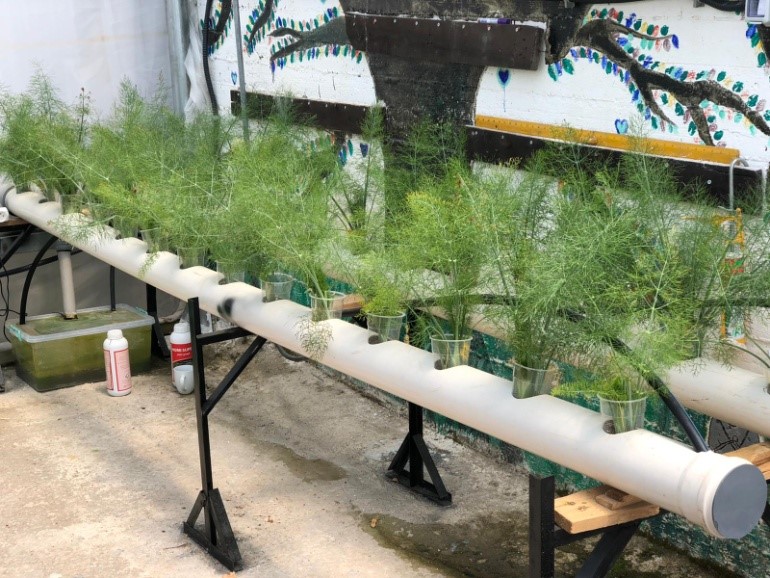 2021: a year for recovery, rebuilding, and renewal. Yet, millions of refugees in the Palestinian Aida Camp remain disproportionately at risk – from rising food insecurities to diminishing irrigated lands for cultivation, everyday life has continued to be a struggle. On top of this, familial traditions are being lost due to the displacement of rural workers, causing many to give-up agrarian methods of sustenance that have been passed down for generations. But there is a glimmer of hope at the end of the tunnel, and this is where Ms. Shatha al-Azza comes into the picture. Shatha, alongside the Lajee Centre, have begun a communal hydroponic garden aimed at providing fresh produce and urban farming training for over 100 people. The project hopes to assist refugees in practicing their rights to healthy, local food through sustainable techniques.
2021: a year for recovery, rebuilding, and renewal. Yet, millions of refugees in the Palestinian Aida Camp remain disproportionately at risk – from rising food insecurities to diminishing irrigated lands for cultivation, everyday life has continued to be a struggle. On top of this, familial traditions are being lost due to the displacement of rural workers, causing many to give-up agrarian methods of sustenance that have been passed down for generations. But there is a glimmer of hope at the end of the tunnel, and this is where Ms. Shatha al-Azza comes into the picture. Shatha, alongside the Lajee Centre, have begun a communal hydroponic garden aimed at providing fresh produce and urban farming training for over 100 people. The project hopes to assist refugees in practicing their rights to healthy, local food through sustainable techniques.
Progress up till now has been outstanding. The installations of horizontal layers and hydroponic pipe systems, for instance, have successfully borne fruit (quite literally, with cultivation ranging from strawberries to prickly pears)! Moreover, the adoption of high-end technology has enabled farmers to measure pH, TDS, and EC levels to ensure optimal conditions for the growth of crops. Then, as a demonstration of the season’s bountiful yield, Shatha has also organised a healthy breakfast get-together prepared using the hydroponic unit’s harvest. To further engage local residents, the team has organised two workshops with specialist agricultural engineers to help train refugees with necessary skills and knowledge on urban agriculture, nutrition, sustainable production, and more. All of the project’s progress has been documented through videos, which can be viewed publicly online via YouTube.
We are extremely supportive of Shatha’s project, and congratulate the team on the programme’s evident success. The building of a communal hydroponic rooftop garden is a long-term and sustainable investment, and we cannot wait to see it in full bloom in the future.